Scottish Wars of Independence
1296 to 1346
Scotland — versus — England
War of Independence, led by William Wallace, 1296-1305 War of Independence, led by Robert Bruce, 1306-1328 Second War of Scottish Independence, 1332-1346
The most famous period of Scottish History is the late 13th and early 14th centuries, when Scotland fought a series of battles to establish its independence from England. The two great heroes of the early war were William Wallace, a commoner, and Robert the Bruce, who after great difficulties, was crowned king of Scotland. At the time of the wars of independence, England was a vastly wealthier and more powerful nation than Scotland, and it had succeeded in at least partially subduing all of its near neighbors, including Wales and Ireland, and was intent on conquering France.
The idea that Scotland could and did stand against England, purely by force of indomitable will, was a source of great national pride in Scotland for generations thereafter. The war did not free Scotland from any further interference by England, nor did it provide her with particularly good government, but it established the Scots reputation as proud and unconquerable people, a legacy they embraced for centuries afterward.
First War of Scottish Independence—William Wallace : 1296-1305
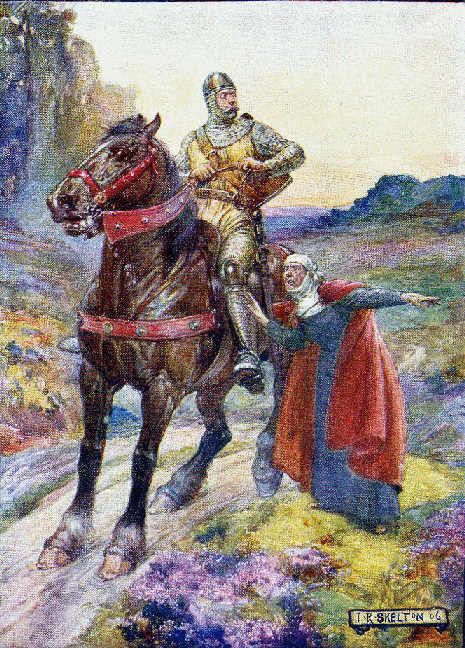 |
When the young queen of Scotland, known as the 'Maid of Norway' died, there was no direct heir to the Scottish throne. Edward I, the English king was quick to promote the cause of John Balliol, and just as quickly demanded he do homage to the English King for all the lands in Scotland, which no Scottish king had ever submitted to before. Balliol paid homage, but refused to provide soldiers to help Edward fight France, since Scotland was a long-time ally of France. Using Balliol's refusal as justification, Edward campaigned in Scotland, first reducing the fortress at Berwick-on-Tweed, and then defeating a large Scottish army at Dunbar. After these smashing victories, Edward experienced little further resistance, and much of the country submitted without further bloodshed. The English governors imposed on the country by Edward however, had little regard for the rights of the Scots, and within a year, William Wallace, a commoner whose wife was murdered by a local English sheriff, had raised a rebellion across the country.
The great victory of Wallace was at the Battle of Stirling Bridge, where his band of infantry soundly defeated an English Army. This was followed by the battle of Falkirk which would have likely gone in favor of the Scots, had more of the Scottish nobles decided to fight for the Scots instead of the English. Falkirk was victory for the English, but a relatively barren one, although it did convince Wallace of the futility of raising an army of commoners unsupported by the local barons. Wallace was later hunted down and killed and for several years, England reigned supreme in Scotland.
| Date | Battle Summary | |
|---|---|---|
| Battle of Dunbar (First )
English victory
Fought April 27, 1296, between the English, under Edward I, and the Scots under the Earl of Athol. The Scots were defeated, with a loss of 10,000 men. This defeat led to the surrender of Balliol, and Edward was proclaimed King of Scotland. | ||
| Battle of Stirling
(First )
Scots victory
Fought September 1297, between the Scots, under Sir William Wallace and Sir Andrew Moray, and the English, 50,000 strong, under the Earl of Surrey. Wallace fell upon the English army as it was crossing a narrow bridge over the Forth, and practically annihilated it. This battle is also called the Battle of Cambuskenneth. | ||
| Battle of Falkirk
(First )
English victory
Fought July 23, 1298, between the English under Edward I, and the Scots under Sir William Wallace. The Scots, who were greatly inferior in numbers, were strongly posted behind a morass, which at first greatly hampered the English attack. In the end, however, the English archers overcame the Scottish defense, and a final charge, led by the king in person, utterly routed them. Wallace escaped from the field, but was a fugitive for the rest of his life. | ||
| Commoner who led resistance to Edward I's conquest of Scotland. | |
| Led a rising in North Scotland against Edward I and joined forces with William Wallace at the Battle of Stirling. | |
| Competent and decisive king of England. Reformed government, pacified Wales and Scotland. Ruled 35 years. | |
| Appointed King of Scotland by Edward I on the condition that he surrender Scotland's independence. |
| Sir William Wallace in | Cambridge Historical Reader—Primary by Cambridge Press |
| First Two Edwards in | The Story of England by Samuel B. Harding |
| John Baliol—The Siege of Berwick in | Scotland's Story by Henrietta Elizabeth Marshall |
| Adventures of Sir William Wallace in | Scotland's Story by Henrietta Elizabeth Marshall |
| Wallace—The Battle of Stirling Bridge in | Scotland's Story by Henrietta Elizabeth Marshall |
| Wallace—The Battle of Falkirk in | Scotland's Story by Henrietta Elizabeth Marshall |
| Wallace, the Hero of Scotland in | Historical Tales: English by Charles Morris |
First War of Scottish Independence—Robert the Bruce : 1306-1328
 |
Once Bruce started winning battles, many Scots who had previously hesitated joined his cause. He took castle after castle, with many towns and fortresses garrisoned by Scots instead of Englishmen, surrendering without a fight. To add to his good fortune, Edward I was in very ill health and his son Edward II, had no compelling interesting in the Scottish war and willingly made peace. For several years after the death of Edward I, his son did not oppose Bruce's growing influence in Scotland, although neither Britain, nor any other monarchical power in Europe recognized him as an independent king. In 1314 however, Bruce besieged Stirling Castle, and the governor there agreed to submit to him on a certain date if England did not relieve him. This compelled the reluctant Edward II into action, and he raised an enormous army to meet the rebellious Scots in battle, and the famous battle of Bannockburn ensued. The Scots were outnumbered, outgunned, and nearly without cavalry, but they won a decisive victory against the English and followed this up with several incursions into English territory. Reluctantly England agreed to recognize Scotland as an independent kingdom, owing only a nominal allegiance to England. Under the reign of a strong king, Robert the Bruce, Scotland re-established its independence from England.
| Date | Battle Summary | |
|---|---|---|
| Battle of Methuen (First )
English victory
Fought June 19, 1306, when a small Scottish force, under Robert Bruce, was attacked and defeated by the English in superior force. | ||
| Battle of Loudon Hill (First )
Scots victory
Fought 1307, between the Scots, under Robert Bruce, and the English, under the Regent Pembroke. Bruce met the attack of the English cavalry with a line of spearmen, which they were unable to break, and they were driven off with heavy loss. Pembroke thereupon withdrew his army and returned to England. | ||
| Battle of Inverurie (First )
Scots victory
Fought 1308, between the Scots, under Robert Bruce, and the English, under Sir John Mowbray, with whom was a small force of Scottish sympathisers with the English claims, under the Earl of Buchan. The English were totally defeated and driven from the field with heavy loss. | ||
| Battle of Bannockburn
(First )
Scots victory
Fought June 24, 1314, between the Scots' under Robert Bruce, and the English invaders under Edward II. Bruce's position was partly covered by a marsh, and further strengthened by pitfalls, in which the English cavalry were entrapped, and defeated with great loss. The king escaped with difficulty and the invasion was abandoned. | ||
| Battle of Inverkeithing (Second Independence )
Scots victory
Fought 1317, between the English invaders, and the Scots, under the Earl of Fife. The first onslaught of the English drove the Scots from their positions, but they were rallied by William Sinclair, Bishop of Dunkeld, and forced the English to retire to their ships. | ||
| Scottish nobleman who claimed the crown and led resistance to England at Bannockburn. | |
| Weak and profligate son of Edward I. Lost all his father's holdings in Scotland. |
| Book Links |
|---|
Second War of Scottish Independence : 1332-1346
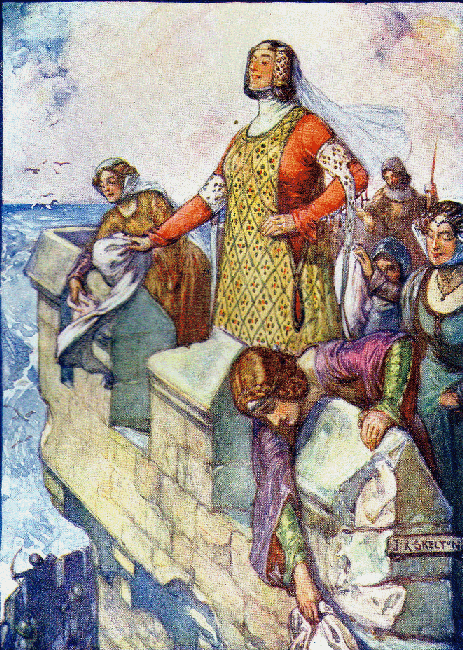 |
David II was either exiled, or imprisoned for much of his reign, and during this time Scotland was really ruled by Robert Stuart, the Grandson of Robert Bruce. When David II died without an heir, the Scot's insisted on crowning Robert II king, although naturally this was contested by England. Under Robert II, the war with England degenerated into periodic border raids, that are better described as ongoing . For the next century England was primarily occupied with the Hundred-Years War in France, and although Scottish-English relations were not good, and the Kings of England continually interfered in the affairs of Scotland, the Stuart line was not contested. Beginning with the reign of Robert II in 1471, the Stuarts ruled Scotland for over 217 years.
| Date | Battle Summary | |
|---|---|---|
| Battle of Dupplin Moor (Second Independence )
English victory
Fought August 12, 1332, between the Scottish barons, under Edward Baliol, and the forces of David, King of Scotland. Though largely outnumbered Baliol was victorious. | ||
| Siege of Halidon Hill (Second Independence )
English victory
Fought 1333, in the course of an attempt by Archibald Douglas, the Regent, to relieve Berwick, which was besieged by Edward III. The Scots were powerless against the English archers, and were defeated with a loss of 30,000, including the Regent, and four Earls. This defeat resulted in the submission of Scotland, and Edward placed Balliol upon the throne. | ||
| Siege of Dunbar (Second Independence )
Scots victory
This town was besieged, 1339, by the English, under the Earl of Salisbury, and was defended by Agnes, Countess of March, known as Black Agnes of Dunbar, whose husband, the Governor, was absent at the time. So vigorous was the defense, that Salisbury was compelled to withdraw from the siege. | ||
| Battle of Neville's Cross
English victory
Fought October 17, 1346, between the Scottish invading army, under David II, and the northern levies, under Henry Percy and Ralph Neville. The Scots were completely routed, with a loss of 15,000 men, and David and many of his nobles captured. | ||
| Countess of Dunbar, renowned for her heroic defense of Dunbar Castle. | |
| Son of Robert the Bruce. Captured by England and imprisoned for 11 years. | |
| First Stuart King of Scotland. Crowned after acting as Regent for David II for many years. | |
| Reigned for nearly 50 years. Invaded France, and won the Battles of Crecy and Calias. | |
| Son of John Balliol. Led and army into Scotland to reassert his claim to the crown. | |
| David II.—The Story of Black Agnes in | Scotland's Story by Henrietta Elizabeth Marshall |
| David II.—The Battle of Neville's Cross in | Scotland's Story by Henrietta Elizabeth Marshall |
Image Links | ||
|---|---|---|
 Scots in the Battle of Bannockburn in Famous Men of the Middle Ages |
 A drive from the Bruce's spear made the rider fall back dead. in The Story of Robert Bruce |
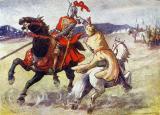 The Bruce drove his battle-axe crashing down on de Bohun's head in The Story of Robert Bruce |
 Bruce lifted his battle-axe high in the air, then brought it crashing down upon the helmet of Bohun. in Our Island Story |
 Hold you, hold you, brave Wallace! The English have hanged all your best men like dogs.' in Scotland's Story |
 At night, when they gathered round the watch-fires, the King would read stories out of old books in Scotland's Story |
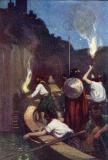 Full of new hope, Bruce sprang to land in Scotland's Story |
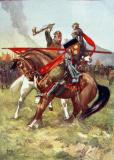 Bruce brought his axe crashing down upon the head of Bohun in Scotland's Story |
 When a stone hit the walls, Black Agnes would bid her maids wipe the spot with a clean white cloth in Scotland's Story |
 Battle of Bannockburn in European Hero Stories |
||